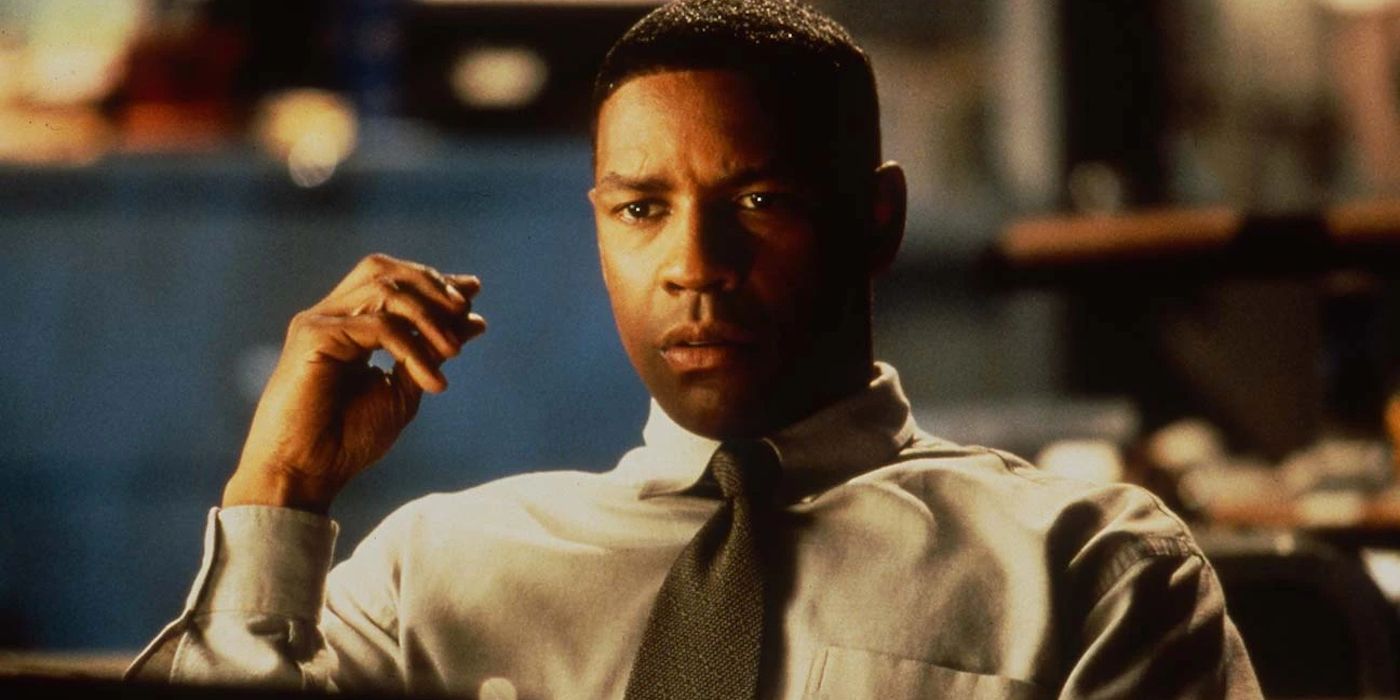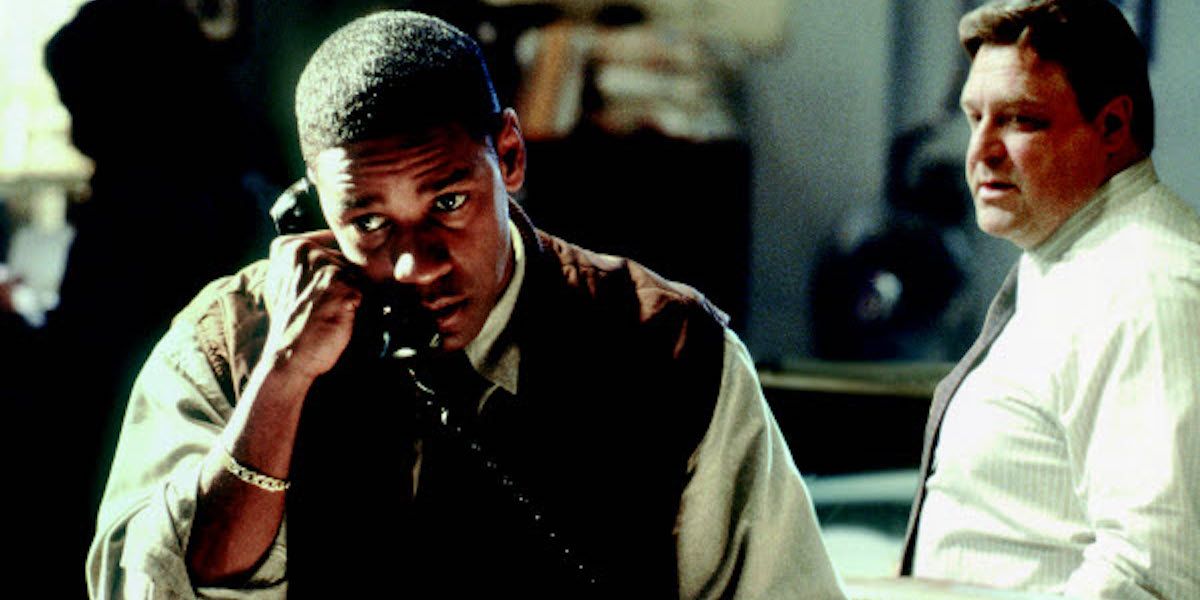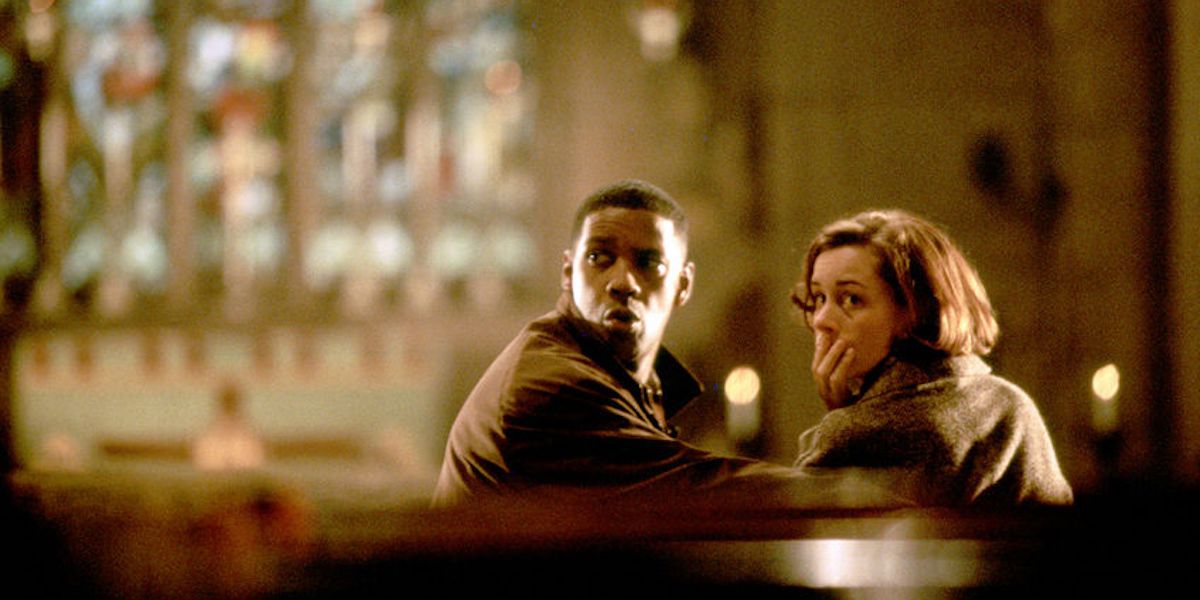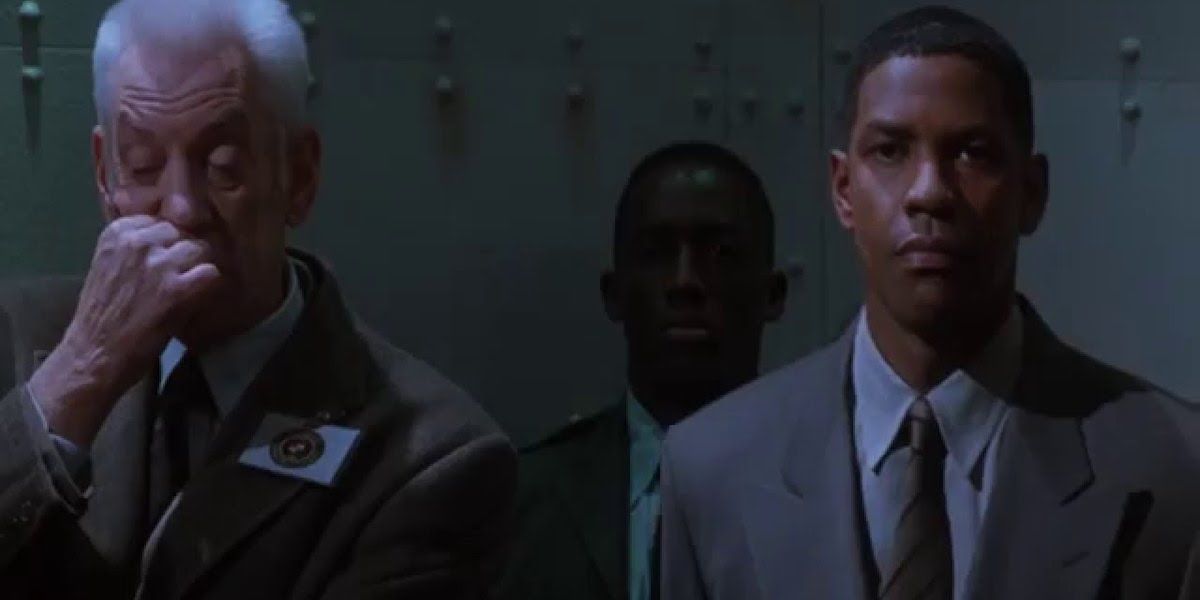There's something about grimy, neo-noir crime thrillers that have withstood the test of time. Maybe it's the hard-boiled detectives, the femme fatales, or the over-the-top mysteries; or maybe it's the deep philosophies that bubble to the surface when our hero finally confronts the mysterious killer. Whatever it is, these stories continue to stick with us long after the credits roll, and for good reason. Films like David Fincher's Se7en or Jonathan Demme's The Silence of the Lambs push the boundaries of what true evil is or could be, and, along with more recent detective thrillers such as Matt Reeves' The Batman, insinuate that evil originates largely from deeper systemic issues. There are others, however, who believe that the nature of evil is greater than the physical, for many there's a high spiritual component as well.
Enter the Denzel Washington thriller Fallen, a forgotten film that has garnered something of a cult following in recent years. Directed by Gregory Hoblit from a screenplay written by Nicholas Kazan, Fallen, which was released in 1998, follows Philadelphia Detective John Hobbes (Washington), a man who, after putting away serial killer Edgar Reese (Elias Koteas), begins to investigate a series of copycat murders. Except, these new occult-like killings aren't done by a copycat at all, rather they're committed by the same entity that used Edgar Reese to commit the original murders, a demon known as Azazel.
Admittedly, it might be easy for some to dismiss Fallen upon the revelation of the demon's influence, surely a detective thriller with a demonic antagonist couldn't work, right? Well, contrary to the film's critical reception, Fallen stands out as one of the most interesting portrayals of demonic possession ever put to film (not to mention managing to be a compelling detective thriller). Azazel is terrifying, and not because he's making heads spin or projectile vomiting across the room. Spoiler alert: he does neither. In fact, there isn't even an exorcism scene in this movie! That said, if you haven't seen Fallen, go watch it now before reading the rest of this. Trust us, it's not one you'll want to miss.
Unlike popular demonic possession flicks such as The Exorcist, Fallen lets go of just about every popular demon-trope in the book, instead opting for a killer with an incredibly distinct personality, more akin to a demon you might see on Supernatural as opposed to The Conjuring. What other demon sings, hums, and whistles The Rolling Stones' "Time is On My Side" incessantly, no matter the hour? While Azazel is played by various actors, his movements, mannerisms, and speech patterns are best noticed when either Elias Koteas or John Goodman are in the driver's seat. While there are some specific demonic mannerisms that Azazel still possesses, such as speaking in tongues, he feels strangely human. Warped, messed up, and clearly psychotic, but human nevertheless.
According to the film's own lore, demons were once angels, God's glorious host meant to bring goodness and light to the world. But, when some followed Satan himself into rebellion, they were cursed to wander the Earth for eternity. Just as we see in some of the most interesting neo-noir pictures, all good creatures can be tempted to evil. The events of the film itself remind us that even good people can turn bad, that even the most impressive saints might "fall from grace" given the opportunity. Hobbes stands out among the rest of his police force, and even among the rest of the city, holding himself to a higher standard of living that keeps him unstained from the sins of the world, and all without judging others for their own vices. While Azazel has little-to-no trouble taking over the bodies of literally anyone else in his path, Hobbes proves to be the demon's only foil, and it drives him crazy.
The demon's plot to make Hobbes his scapegoat didn't stem from anger or revenge for killing his former host Edgar Reese, but rather from his warped desire to tempt the souls of men, just as his once was. Interestingly, the word Azazel is also associated with an ancient Hebrew ritual of Yom Kippur, in which the tribes of Israel would send a scapegoat into the wilderness "for Azazel" (see Leviticus 16:8). Like every great detective thriller, our hero is forced to make a choice: continue to be a good man, or succumb to the darkness. Unlike his demonic adversary, Detective Hobbes ultimately chooses the former, saving the life of his young nephew and theology professor Gretta Milano (Embeth Davidtz) by sacrificing his own. His heroic act of selflessness saves his soul from corruption, even if he doesn't actually take Azazel down with him.
Unlike most detective thrillers, Fallen is narrated by its antagonist rather than our hero, though we don't know it until the end. Azazel's words prime us for the ending, preparing us for Hobbes' eventual climax and the demon's sort-of victory. This is truly significant as the killer is framing the narrative to match his own needs, wants, desires, and especially fears. When you rewatch the film after this frightening revelation, there's a new depth to Washington's words as Hobbes and Azazel make their way through their respective lives. In truth, it adds a whole new meaning to the phrase "twist ending."
But the scary part about this revelation is that we can hardly discern who's actually been speaking. It could easily have been either Hobbes or Azazel the entire time or some sort of combination of the two, and either way, it would hardly change the movie (sans the ending). This clever play on the often overplayed "we're not so different, you and I" trope makes Fallen stand out among a sea of crime movies that blur the lines between good and evil. Of course, this film makes both sides abundantly clear, with a serious divide in between, but it reminds us that it's easy to blend them if pushed close enough to the edge. Even in his final heroic moments, sacrificing himself to try and kill Azazel, Hobbes kills his partner Jonesy (Goodman), which comes after the demon tricked the detective into killing an innocent schoolteacher.
Not only are the events of Fallen told through the killer's point-of-view, but the images themselves often vividly reflect it. We're not talking about clever POV shots as the killer stares at his next victim via binoculars from across the street, rather the actual look of the film changes whenever we enter the demon's perspective. According to IMDb, this "demon vision" was achieved through a film stock called Ektachrome, differing frame rates, and multiple exposures which created the sporadic yellowish effect. This creates an unsettling-yet-effective atmosphere, putting us completely on edge as we watch Detective Hobbes work desperately to solve these occultic string of murders. It's especially frightening at the end of the movie when the demon confronts our hero in the woods...
Speaking of, as Hobbes dies trying to kill Azazel, he believes that he's finally won and rid the world of this primordial evil. By starving the demon of another bodily host, its spirit should dissipate into eternal nothingness. But, though only the audience and Azazel know it, a cat appears to save the weakened demon from death, reminding us that this story is not about evil's end, but about how it "almost" died. This retroactively makes Fallen feel almost more like a horror film rather than a standard detective thriller, in which the monster "dies" only to suddenly return to haunt the world again.
And that's kind of the whole point, isn't it? You can't kill evil. It'll always exist, no matter how hard you try to suffocate or ignore it. Unlike a human being, such as Hobbes, whose life will come to a natural end, Azazel represents the apparent immortality of evil, or at least its longevity. Azazel's message to Hobbes, the word "Apocalypse," which comes from the Greek word meaning "revelation" (yes, as in the Book of Revelation), seems to imply that the demon and his fallen siblings will continue to ravage the world for as long as they can. While the film makes the case that God and his angels will one day defeat evil for good, the here-and-now of it is that evil still exists, and while it can lie low for a time, it isn't going anywhere.
Although the ending of Fallen may feel bleak, it's not completely hopeless. Earlier in the film, Gretta Milano mentions that she and a group of others believe that they have been chosen to fight said-evil, to push back against the darkness. She even believes that Hobbes, before his death, was one of these people. This is reminiscent of what the Apostle Paul writes in Ephesians 6:12 when he says, "For we are not contending against flesh and blood, but against the principalities, against the powers, against the world rulers of this present darkness, against the spiritual hosts of wickedness in the heavenly places." Since Milano and Hobbes' nephew Sam (Michael J. Pagan) made it out alive, we're left with the final hope that although Azazel won the battle, he won't win the war. While evil might rear its ugly head each and every day, Fallen reminds us that we all have a choice whether we give in to its seductive voice or reject it completely, clinging rather to goodness and truth.




